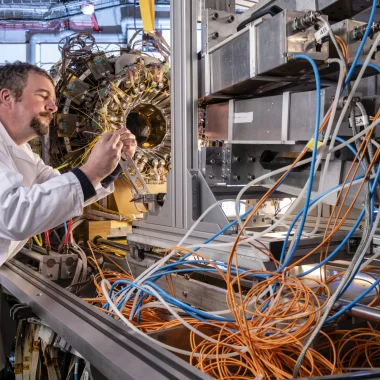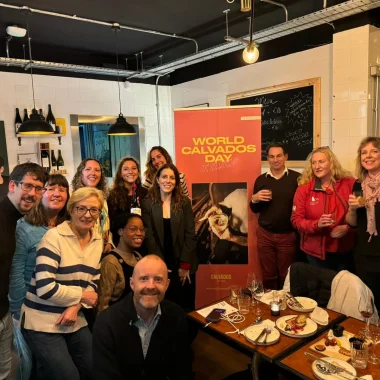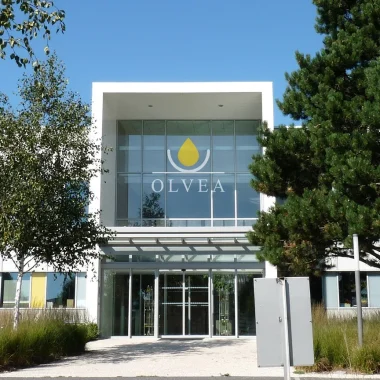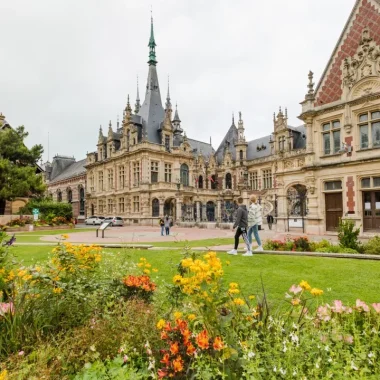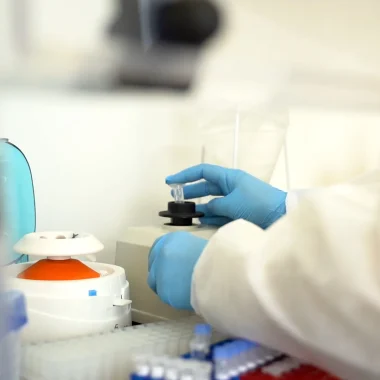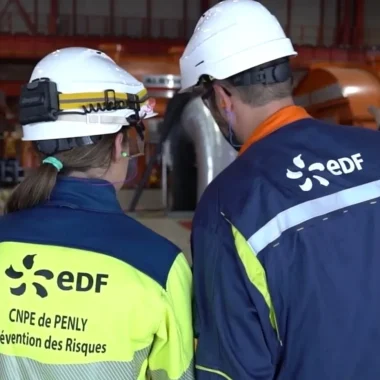Frédéric Vardon was born in Eure. His parents were butchers/caterers and came from farming stock between Orne and Calvados. He is now a famous chef at Le 39V, a restaurant in the golden triangle in the 8th arrondissement in Paris. He began his career in Paris at Au Trou Gascon, went to work for Michelin-starred chef Alain Chapel in Lyon then joined Alain Ducasse in 1994, working in restaurants all over the world until 2008. Frédéric Vardon takes pride in his Normandy roots and local produce has a special place in his heart. He mentored La Grande Débarque in 2022, an event celebrating one of the Normandy coast’s greatest delicacies: the famous Normandy scallop.
What made you become a chef?
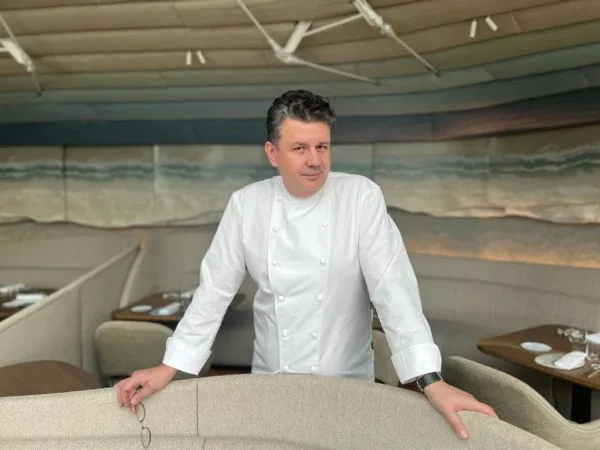
I wasn’t meant to go into hospitality: I wanted to be a farmer as I’m passionate about breeding animals. My father saw how my uncles struggled to make a living from their work and farm, so he told me I’d be better off in a job where I could celebrate agriculture. I liked cooking so I went for it!
My job means I get to meet all kinds of farmers: Bresse chicken, Gournay chicken and more. The farmers are extraordinary, but so are the people that showcase their produce! For example, there’s a butcher in Rouen called Boucherie Grosdoit which supplies us with Gournay chicken and Normandy grazed beef, meaning the cows feed on grass, beetroot etc. Every industry deserves respect.
It’s also our duty as chefs to explain to customers that grazed beef steak doesn’t have the same price tag as a calf fed GM cattle cake in a barn. The risks, care and age are all different. We only buy meat from animals that are 3 years old at Le 39V.
Eat good food, eat less, but eat better to protect a quality local economic fabric.
How would you describe your cookery style and your trade?
I think that food is intrinsic to society and I firmly believe that our role as chefs, no matter what kind of restaurant it is, is to pass on our values. Is it helpful to say you can eat anything, anyime? I don’t think so, I actually think the opposite. I try to use good, seasonal ingredients and elevate them. My style is classic French cuisine focusing on regions, local areas and produce. I see cookery as the final moment of a very lengthy process: you have to source the product, pin-point who will provide me with the product, is there a philosophy behind it? Does it match my values? How long will we be able to serve it for? Animal welfare is very important to me as well, it’s an essential criteria.
Cookery is actually one of the easiest jobs. All we have to do is make people happy. Make memories. Every day is different in our trade. It’s an amazing job because there’s a social aspect, there’s joy, there’s sweat, there’s hard work, there’s exhaustion, there’s happiness, all in the same day. We’re not the ones taking the biggest risks: our job is to cook, make it look pretty and serve with a smile. I think the risk factor is far higher among farmers. It’s up to us to explain that to the customers.
Do you have other products from Normandy on the menu?
Absolutely! Aside from the products I’ve already mentioned, we’re going to try to get Bayeux pork from Grosdoit butchers. We also have a few cider-based products on the menu. A few calvados options, but not enough I’m sorry to say!
I like very fruity things, so I have my own orchard. It’s small but it has a very high yield: so I make a dessert using stewed apples with a buckwheat milk jam and all the apples come from my orchard! I’m not sure that the idea of seasons is really relevant nowadays or matters, but I am sure that it doesn’t mean the same as it used to.
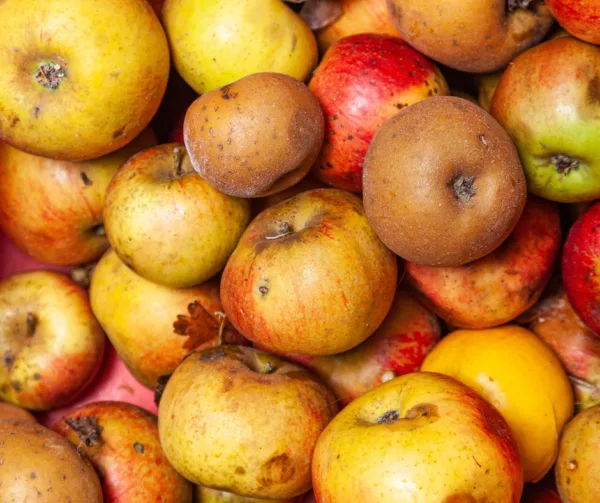
Climate change means diversity in our woodlands and countryside too: it doesn’t all depend on harvests. You also need cattle to trample it, to naturally sow the land and graze. It’s the circle of life, there’s an ecosystem at play with insects, birds that eat the insects etc. I think small farms need as much help as possible, not just farms with at least 150-200 dairy cows. Why can’t you make a living off twenty cows nowadays? It also keeps our cultural heritage alive, which is something we tend to overlook.
A chef's job is to find, source, think, make and assemble. Cooking is one of the last stages before giving people a little joy.
What’s your relationship with the Normandy scallop?
The Normandy scallop has always been a luxury product for big occasions, ever since I was a boy. I think we should give it the respect it deserves: scallops have a fishing season and every restaurant of every size should have them on the menu during the season! Getting scallops in July is inconceivable to me. The same goes for salmon and foie gras: they were premium products 30 years ago whereas nowadays, you get whole shelves of them all year round. I don’t understand why there aren’t more regulations. Give the ecosystem time to recuperate. Scallops are a prime example: they were in decline a decade ago, but now, there are regulations in place and they’re thriving. There are quotas and sizes: that means everyone can enjoy them at competitive prices. I think the people in charge of the fishing areas have done some incredible work that has gone unnoticed. We need to tell people that the scallops they get out of season are from Scotland, they’re washed and full of water.
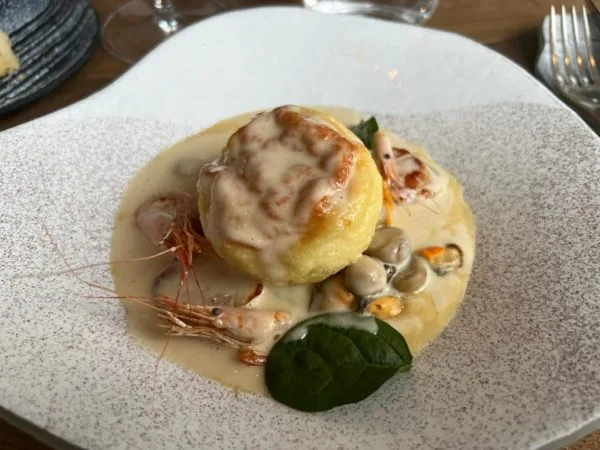
You mentored La Grande Débarque, what does the event mean to you?
I had the honour of speaking about the Normandy scallop and I’m delighted to have had the opportunity. I champion any product that matters and which involves hard graft. When it’s in season, our menu includes raw scallops and a Dieppe scallop soufflé with shrimp, spinach, mussels and button mushrooms. Essentially, it’s an opportunity for us to tell customers about Normandy scallops: where it comes from, where it’s caught (which area or in Baie de Seine over the season), why it has its coral etc. Many of my customers know what it is but a lot of foreign customers don’t. We’re sharing a little heritage that way: that’s another part of our job. We don’t just cook; we share, we explain, sometimes we’re a bit intense or passionate about it but that’s OK! (laughs)
It's an honour to be able to champion a product from the region and introduce it to people
Do you come back to Normandy often?
I’d actually like to stay here! I plan to buy a small farm with a few cows because the Normande breed is in danger and I want to help it any way I can. If I can serve some of my meat at one of my restaurants, I think I’ll have done my job.
What sets Normandy apart?
It has everything: the region has everything you could wish for in terms of seafood and agriculture. You could build a wall around it and live off it for centuries. We make great cider, some places are making wine, we just have to wait a bit.
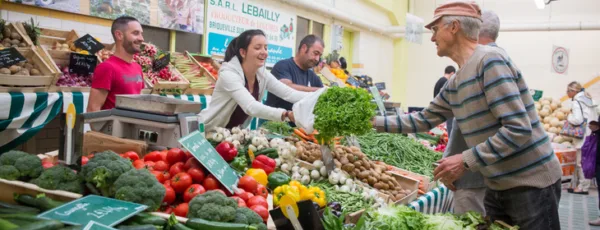
Which dish makes you nostalgic for Normandy?
A dish my grandmother alone knew how to make, so I’ve not eaten it since her: it was called “une courée de porc” in Normandy patois. It’s a pig lung stew which we’d eat with garden vegetables. It was simply incredible! Then for pudding, teurgoule rice pudding but without cinnamon. I have fond memories of delicious Sunday roast chicken too.
Thematics

